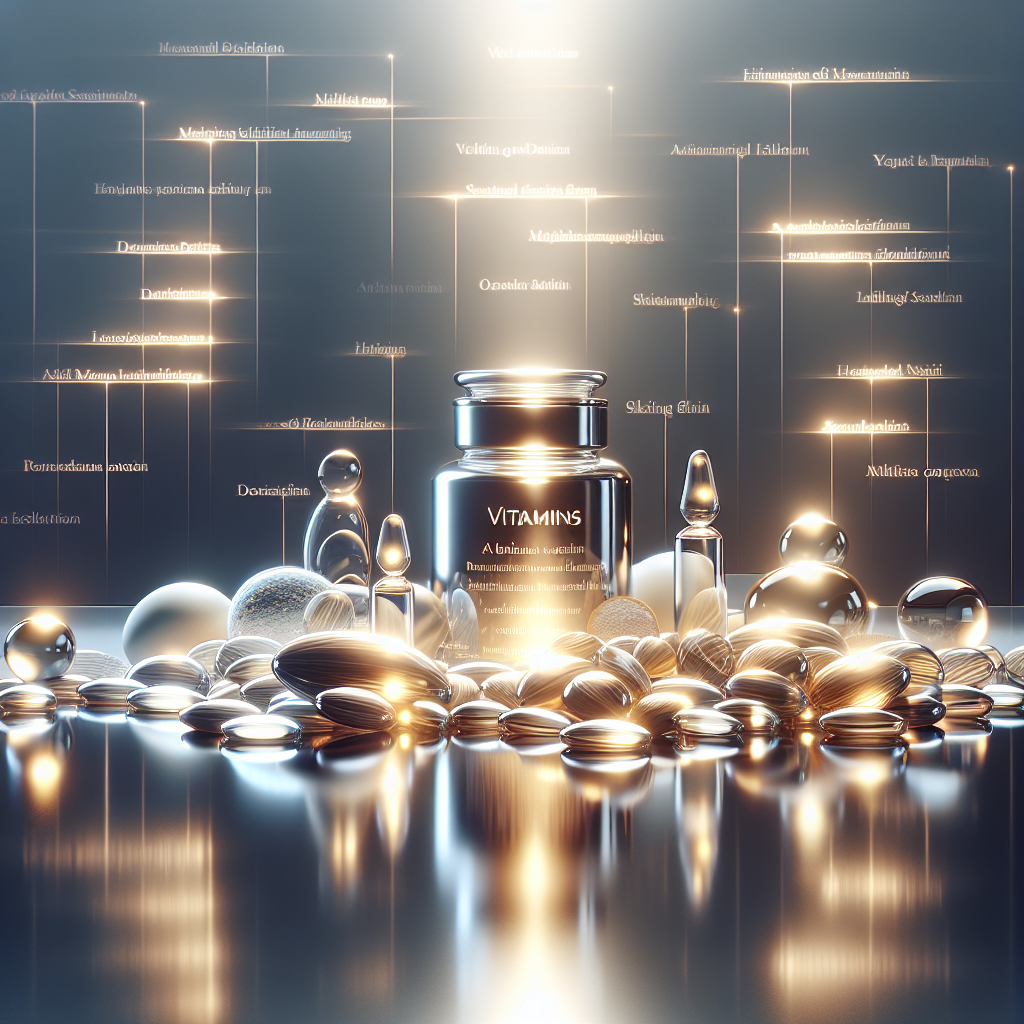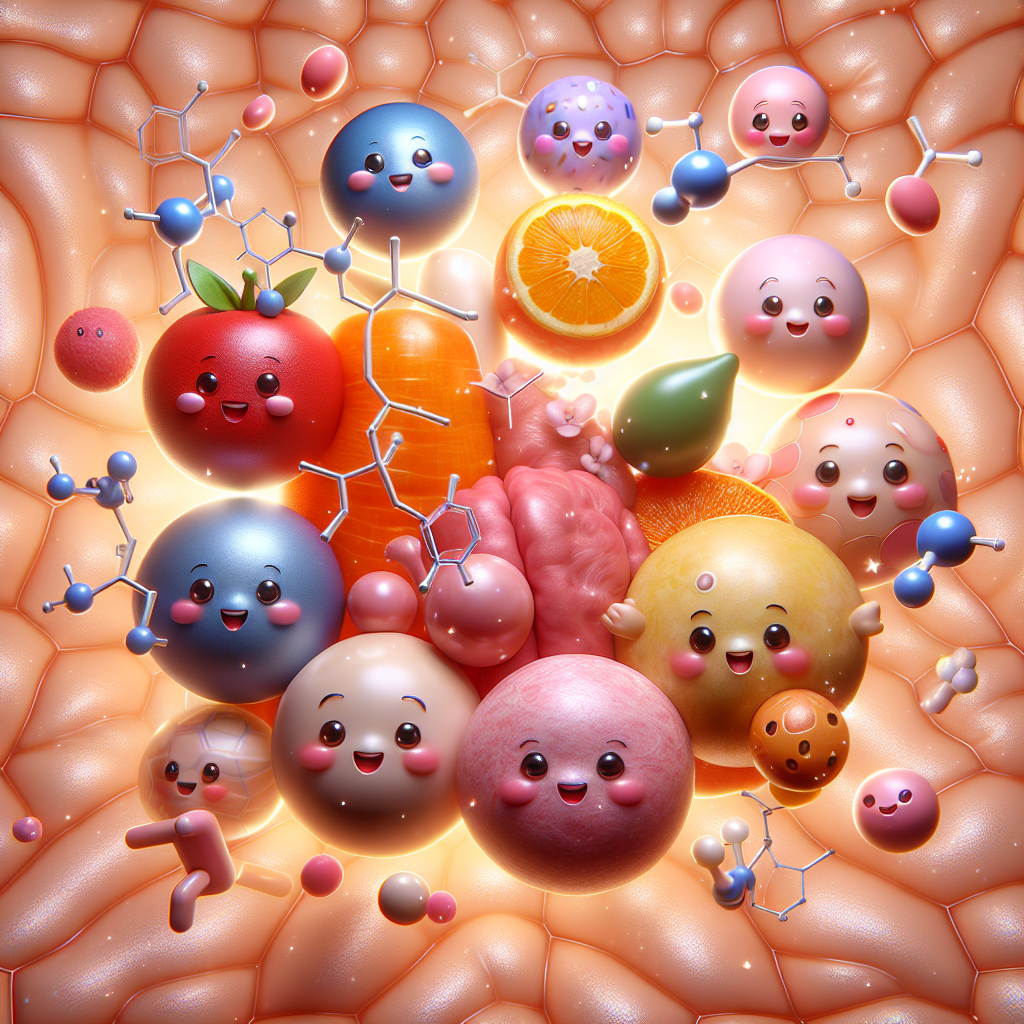Vitamins That Keep Skin Looking Youthful

Discover the secret to youthful-looking skin with our range of vitamins. Don’t wait, rejuvenate your skin today! Click here to explore our products.
Essential Vitamins for Maintaining Youthful Skin
The quest for youthful, radiant skin is a universal pursuit that transcends age, gender, and culture. While many turn to expensive creams, serums, and other topical treatments, the secret to maintaining a youthful complexion may lie in something far simpler: vitamins. Indeed, certain vitamins play a crucial role in skin health, helping to combat the signs of aging and keep skin looking fresh and vibrant.
Firstly, let’s consider Vitamin A. This essential nutrient is renowned for its potent anti-aging properties. It works by normalizing skin functions, which means it can correct all skin conditions, including wrinkles, lines, and pigmentation. Retinol, a derivative of Vitamin A, is a common ingredient in many skincare products due to its ability to accelerate skin cell turnover and stimulate collagen production. This results in smoother, more youthful-looking skin.
Next on the list is Vitamin C, often hailed as a ‘skin savior.’ This powerful antioxidant aids in neutralizing harmful free radicals that can cause damage to our skin cells. It also plays a vital role in collagen synthesis, a protein that gives our skin its firmness and elasticity. Regular intake of Vitamin C can help to reduce the appearance of wrinkles and fine lines, and even protect the skin from the damaging effects of the sun.
Vitamin E, another antioxidant, works in tandem with Vitamin C to protect the skin from sun damage and environmental stressors. It also has moisturizing and healing benefits, helping to strengthen skin barrier function and keep the skin hydrated. This can result in a more plump, youthful complexion.
Vitamin B3, also known as niacinamide, is another key player in maintaining youthful skin. It helps to improve the skin’s elasticity, erase discolorations, and revive skin’s healthy tone and texture. It also has anti-inflammatory properties, making it effective in reducing redness and blotchiness.
Lastly, Vitamin K is often overlooked but is essential for preventing dark circles and healing small wounds and bruises. It works by aiding the body’s process of blood clotting, which helps to heal wounds, bruises, and areas affected by surgery. The topical use of Vitamin K can reduce bruising and improve the appearance of dark under-eye circles, two common skin issues that can age your appearance.
While these vitamins can be applied topically via skincare products, they can also be obtained through a balanced diet. Foods rich in these vitamins include carrots and sweet potatoes for Vitamin A, citrus fruits for Vitamin C, nuts and seeds for Vitamin E, chicken and tuna for Vitamin B3, and leafy green vegetables for Vitamin K.
In conclusion, maintaining youthful skin is not just about what you put on your skin, but also about what you put in your body. A diet rich in essential vitamins, coupled with a good skincare routine, can help to keep your skin looking youthful and radiant. However, it’s important to remember that everyone’s skin is different, and what works for one person may not work for another. Therefore, it’s always best to consult with a dermatologist or nutritionist to determine the best approach for your specific skin needs.
The Role of Vitamins in Skin Anti-Aging

The quest for youthful, radiant skin is a universal pursuit that transcends cultures and generations. While many factors contribute to the health and appearance of our skin, one aspect that often goes overlooked is the role of vitamins. Vitamins, both consumed through diet and applied topically, play a crucial role in maintaining the skin’s youthful appearance and slowing down the aging process.
Vitamin A, also known as retinol, is one of the most potent anti-aging vitamins. It stimulates the production of new skin cells, helping to reduce the appearance of fine lines and wrinkles. It also aids in the repair of skin damage caused by sun exposure and environmental pollutants. Retinol is found in a variety of foods, including carrots, sweet potatoes, and spinach, and is also available in topical creams and serums.
Vitamin C is another essential vitamin for skin health. It is a powerful antioxidant that neutralizes harmful free radicals, which are unstable molecules that can damage cells and contribute to aging and diseases. Vitamin C also plays a vital role in collagen synthesis, a protein that gives skin its elasticity and firmness. Citrus fruits, strawberries, and bell peppers are excellent sources of vitamin C. Topical vitamin C serums can also provide direct benefits to the skin, including brightening the complexion and reducing the appearance of dark spots.
Vitamin E, like vitamin C, is a potent antioxidant that protects the skin from oxidative damage. It also has anti-inflammatory properties that can soothe and calm irritated skin. Foods rich in vitamin E include nuts, seeds, and leafy green vegetables. When applied topically, vitamin E can help to moisturize the skin and reduce the appearance of scars.
Vitamin B3, also known as niacinamide, is another key player in skin health. It helps to improve the skin’s barrier function, which keeps harmful substances out and locks moisture in. This can result in smoother, more hydrated skin. Niacinamide also has anti-inflammatory properties and can help to reduce redness and irritation. Foods such as chicken, tuna, and mushrooms are rich in vitamin B3. It is also available in a variety of skincare products, including creams, serums, and masks.
Vitamin K is often overlooked but plays a crucial role in the body’s blood clotting process, which can help to heal wounds and bruises. It may also help to reduce dark circles under the eyes by improving blood circulation. Green leafy vegetables, broccoli, and Brussels sprouts are good sources of vitamin K. Topical creams containing vitamin K can also help to improve the appearance of spider veins and rosacea.
In conclusion, vitamins play a vital role in maintaining youthful, healthy skin. A balanced diet rich in vitamins, coupled with the use of topical skincare products, can help to slow down the aging process and keep your skin looking its best. However, it’s important to remember that while vitamins can provide significant benefits, they are just one piece of the puzzle. Regular exercise, adequate sleep, and proper hydration are also essential for optimal skin health.
Top Vitamins to Incorporate for a Youthful Skin Glow
The quest for youthful, glowing skin is a universal pursuit that transcends age, gender, and culture. While topical skincare products and treatments play a significant role in maintaining skin health, the importance of nourishing the skin from within cannot be overstated. One of the most effective ways to achieve this is by incorporating certain vitamins into your diet. These vitamins not only contribute to overall health but also play a crucial role in maintaining the skin’s youthful glow.
Vitamin A, often found in foods like sweet potatoes, carrots, and spinach, is one of the most potent vitamins for skin health. It promotes cell turnover, which is the process by which new skin cells replace old ones. This process is vital for keeping the skin looking fresh and youthful. Moreover, Vitamin A has been shown to stimulate collagen production, a protein that gives the skin its elasticity and firmness. By boosting collagen levels, Vitamin A helps to reduce the appearance of fine lines and wrinkles, common signs of aging.
Next on the list is Vitamin C, a powerful antioxidant that protects the skin from damage caused by free radicals. Free radicals are unstable molecules that can damage cells, leading to premature aging. By neutralizing these harmful molecules, Vitamin C helps to maintain the skin’s youthful appearance. Additionally, Vitamin C plays a crucial role in collagen synthesis, further contributing to skin firmness and elasticity. Citrus fruits, strawberries, and bell peppers are excellent sources of this essential vitamin.
Vitamin E, another antioxidant, works in tandem with Vitamin C to protect the skin from sun damage. It absorbs harmful UV light from the sun when applied topically, preventing dark spots and wrinkles. Moreover, Vitamin E helps to keep the skin hydrated by strengthening the skin’s barrier function, which prevents moisture loss. Foods rich in Vitamin E include nuts, seeds, and leafy green vegetables.
Vitamin B3, also known as niacinamide, is another essential vitamin for skin health. It improves the skin’s barrier function, helping to lock in moisture and keep the skin hydrated. Additionally, Vitamin B3 has anti-inflammatory properties, which can help to soothe redness and irritation. It can also regulate oil production, making it beneficial for those with oily or acne-prone skin. Foods like chicken, tuna, and mushrooms are rich in Vitamin B3.
Lastly, Vitamin K is known for its ability to improve the appearance of skin discoloration. It helps with the body’s blood clotting process, which can reduce the appearance of dark circles and bruises. Green leafy vegetables like kale and spinach are excellent sources of Vitamin K.
In conclusion, incorporating these vitamins into your diet can significantly improve your skin’s health and appearance. However, it’s important to remember that while these vitamins can contribute to skin health, they are not a substitute for a balanced diet, regular exercise, and a consistent skincare routine. It’s also advisable to consult with a healthcare professional before starting any new dietary regimen. With the right approach, achieving youthful, glowing skin is within everyone’s reach.